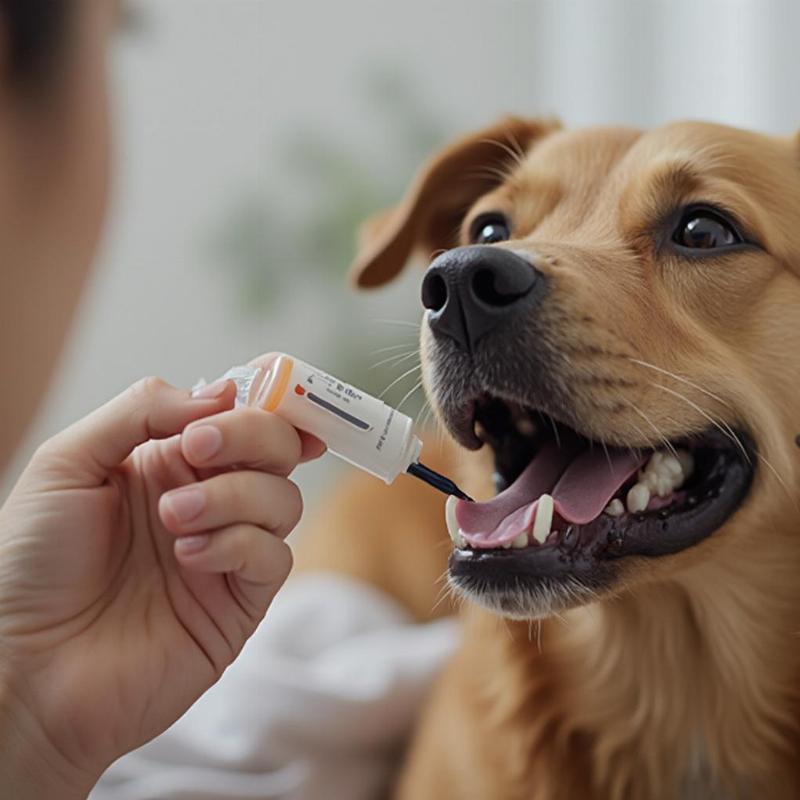Worms in dogs can cause a range of health problems, and bloody diarrhea is a potential symptom. Understanding the link between worms and this alarming symptom is crucial for every dog owner. This article will explore the different types of worms that can cause bloody diarrhea in dogs, how to recognize the signs, and what treatment options are available.
Understanding the Connection Between Worms and Bloody Diarrhea
Intestinal parasites, commonly known as worms, can irritate and inflame a dog’s digestive tract. This inflammation can lead to various gastrointestinal issues, including bloody diarrhea. The presence of blood in your dog’s stool can range from a few streaks to a more significant amount, depending on the severity of the infestation and the specific type of worm.
Types of Worms That Cause Bloody Diarrhea in Dogs
Several types of worms can be responsible for causing bloody diarrhea in dogs:
- Hookworms: These small, bloodsucking worms attach to the intestinal wall and can cause significant blood loss, leading to anemia and bloody stool.
- Whipworms: Whipworms reside in the large intestine and cecum, causing inflammation and irritation that can result in bloody diarrhea, particularly in severe infestations.
- Coccidia and Giardia: While not technically worms, these single-celled parasites can cause similar symptoms, including bloody diarrhea, especially in puppies and dogs with weakened immune systems.
Hookworms in Dogs: A Closer Look
Hookworms are a particularly dangerous parasite as they feed on the dog’s blood. A severe hookworm infestation can quickly lead to anemia, especially in puppies. The blood loss contributes to bloody diarrhea, lethargy, and pale gums.
Whipworms in Dogs: Symptoms and Diagnosis
Whipworms are more challenging to diagnose because their eggs are not always readily visible in stool samples. The characteristic symptom is often bloody diarrhea accompanied by weight loss and general discomfort.
Coccidia and Giardia: Microscopic Threats
Coccidia and Giardia are microscopic parasites that can cause severe diarrhea, often containing mucus and sometimes blood. These parasites are highly contagious and are particularly prevalent in environments where multiple dogs are housed together.
Recognizing the Signs: When to Worry
Bloody diarrhea is a serious symptom and shouldn’t be ignored. Other signs that may accompany worm-related bloody diarrhea include:
- Vomiting
- Weight loss
- Lethargy
- Dehydration
- Changes in appetite
- A dull, dry coat
If your dog displays any of these symptoms, it’s crucial to consult a veterinarian immediately.
Diagnosing Worms in Dogs
Your veterinarian will diagnose worms by performing a fecal examination. This involves analyzing a sample of your dog’s stool under a microscope to identify worm eggs or parasites.
Treatment Options for Worm-Related Bloody Diarrhea
Treatment for worm infestations will vary depending on the specific type of worm identified. Your veterinarian will prescribe the appropriate medication, typically an oral dewormer. It’s crucial to follow your veterinarian’s instructions carefully and complete the entire course of treatment, even if your dog’s symptoms improve.
Preventing Worm Infestations in Dogs
Prevention is always better than cure. Here are some steps you can take to prevent worm infestations:
- Regular deworming: Follow your veterinarian’s recommendations for routine deworming.
- Fecal examinations: Schedule regular fecal exams, especially for puppies and dogs living in multi-dog environments.
- Hygiene: Practice good hygiene, including picking up your dog’s feces immediately.
- Environmental control: Clean your dog’s living area regularly to remove potential sources of infection.
 Dog Receiving Deworming Medication from Owner
Dog Receiving Deworming Medication from Owner
Conclusion
Can Worms Cause Bloody Diarrhea In Dogs? Yes, they absolutely can. Bloody diarrhea is a serious symptom that requires immediate veterinary attention. By understanding the various types of worms, recognizing the signs, and practicing preventative measures, you can help protect your furry friend from these harmful parasites. Remember, regular veterinary checkups and preventative deworming are essential for maintaining your dog’s health and well-being.
FAQ
- What should I do if I see blood in my dog’s stool? Contact your veterinarian immediately.
- How often should I deworm my dog? Follow your veterinarian’s recommendations for a deworming schedule.
- Are all worms visible in dog stool? No, some worm eggs are microscopic and require laboratory analysis to detect.
- Can humans get worms from dogs? Yes, some types of worms can be transmitted from dogs to humans, emphasizing the importance of hygiene.
- What is the best way to prevent worms in dogs? Regular deworming, fecal examinations, and good hygiene are key preventive measures.
- Are over-the-counter dewormers effective? It’s essential to consult your veterinarian before using any over-the-counter medications. They can determine the specific type of worm and recommend the most effective treatment.
- Can stress cause bloody diarrhea in dogs? While stress can contribute to digestive upset, bloody diarrhea is more likely a sign of a more serious issue like a parasitic infection.
